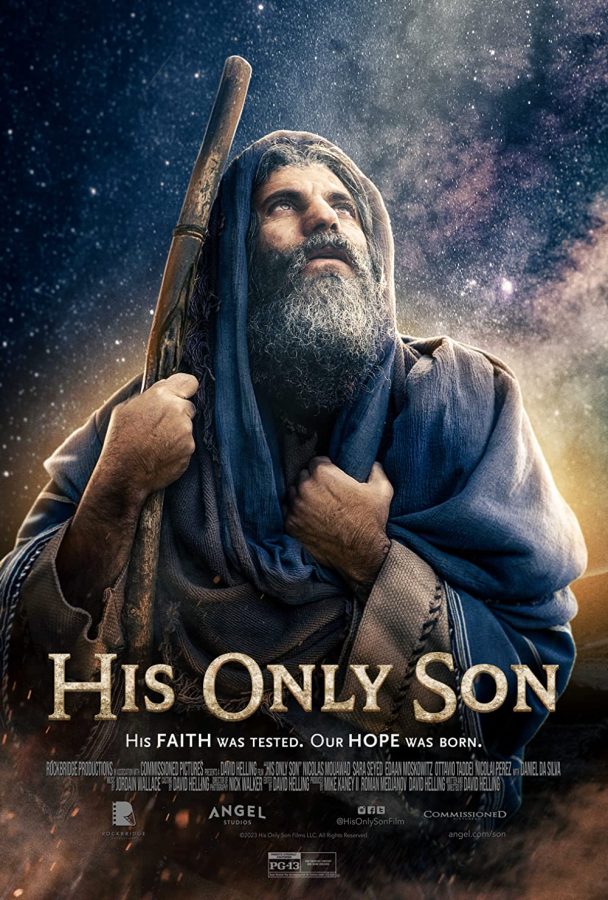“His Only Son” Does Little to Push Beyond B-Movie Status
The combination of bad editing, shoddy makeup and poor pacing make “His Only Son” a mediocre flick.
April 17, 2023
The story of Abraham from the book of Genesis has been told for thousands of years. I hadn’t really taken in the story before, so I entered “His Only Son” this past Easter not knowing what would happen. While the acting was at times moving, I found that the overall effect of the movie was drab and in the end was not worth the watch.
The story follows Abraham (Nicolas Mouawad) and his son, Isaac (Edaan Moskowitz). When Isaac is in his teens, Abraham goes on a pilgrimage to what is later known as Canaan, leaving Ur and his wife, Sarah (Sara Seyed) behind. He brings Isaac with him, as well as his two followers, Kelzar (Ottavio Taddei) and Eshcolam (Reji Lukai). On their pilgrimage, we discover that the purpose of this pilgrimage is to sacrifice Isaac at their destination, which creates a rift between Kelzar and Eshcolam, the former believing that Abraham’s acting out God’s will and the latter doubting it. Nonetheless, the travelers reach their destination and, upon preparing Isaac for sacrifice, Abraham is told that he doesn’t have to sacrifice his son, and that it was more of an exercise to show his devotion to the Lord.
Related to this, an issue I had was the overall plotting of the movie. The film was riddled with cuts from scenes taking place in the current setting of the film, while they are traveling, to years ago in the life of Abraham and Sarah. There were some beautiful vignettes in these flashback scenes, one specifically being of Sarah leaving their home tent to cry at a tree after giving up her handmaid to Abraham for them to be able to have a child, her blue scarf shimmering against the moonlit tree with a city in the background and torches lighting her way. The rest of the scene didn’t carry that same ambience. The lighting was omnipresent, with attention rarely being brought to certain features or parts of the shot with lighting. It was only when the travelers were around their campfire that, when they were speaking to each other, only their faces were lit, bringing a special attention to their conversation. The same happened in particular moments of Abraham and Sarah talking about their future, where the lighting focused on their faces, putting greater attention on their expressions, especially Sarah’s. Otherwise, even in the ultimate scene of Abraham preparing to sacrifice his son Isaac, the lighting is omnipresent, with no subtle or deep contrasts between specific elements of the frame.
There were also gaffs or missteps that didn’t make sense or didn’t follow from the tone of the scene, like double cutting on Abraham’s face. Another was the sound editing. There were many times where the audio would crack or break because it was too loud and not mixed correctly.
Furthermore, during the action scenes, the intention of certain shots became questionable, as when Eshcolam throws a rock at the lead horseman who, with his comrades, harass Abraham and his followers on their trip. It seems as though the rock is incapacitating the lead horseman, but this doesn’t happen. Instead, we see a rapid cut between Isaac and Abraham’s reactions.
Trying to build momentum with the pacing that almost constantly went between the current happenings of Abraham and his life before then with Sarah led to a confusing mishmash of Abraham walking, Abraham bowing at God’s feet or talking about what God has told him to Sarah decades in the past. These scenes didn’t give a straightforward, understandable narrative.
What was most notable throughout the film were Abraham’s expressions being one note: a straight face. Even when his wife would cry to him about not feeling taken care of or not having her feelings considered, his expression wasn’t tender or real; it was expressionless. The explanation that someone I went with to see the movie was that he was constantly in touch with God, so his fixed face must’ve been him constantly being told what to do according to God’s will. But this explanation doesn’t hold when this isn’t at all suggested in the movie.
Sarah’s acting had a few interesting notes, one being her furrowing her brow and crying which showed up often and was, at times, dull or too much, but at others worked well in the scene.
Isaac didn’t have much range, and his introduction felt unnecessary or bizarre in how cleanly and effeminate his look was, but the intention was most likely to portray him as a teenager almost in the modern sense. Instead of him being a rugged teen-man from thousands of years ago, he’s a young-Marlon-Brando look-alike whose character is meek and wimpy. It felt jarring to see him against the background of a father and peers who were clearly from a different time than he was.
Something that was at times obvious because of the lighting was the makeup and styling. The characters lived thousands for years before the existence of Jesus, and yet they looked like they just had their eyebrows waxed and facial hair trimmed. Abraham’s wig wasn’t believable at all. It was a weirdly shiny silver, something you’d find in a Halloween store. The makeup, especially Abraham’s, was revealed in many scenes and took me out of the movie. It wasn’t blended well enough, so it looked padded on, and the wig was obvious. If it wasn’t a wig, it was something that didn’t convince me he was old, instead it wasn’t enough time in the fitting room.
The supporting cast did a decent job of propping up the movie. Taddei, playing Kelzar did an above-par, varying performance as the devout follower of Abraham, while Lukai, as Eshcolam was lacking at times, giving a straight face in scenes where it wasn’t appropriate or made no sense dialogue-wise.
Of course, we’re talking about a story in the Bible, which is thousands of years old and is common knowledge for countless people. So, how does the movie set this up for something satisfying or interesting? It doesn’t. It doesn’t try to do anything interesting. We’re brought to the point where Abraham realizes that he doesn’t need to sacrifice his son, at which point we abruptly and inappropriately switch to Jesus’ crucifixion. We’re then given text on screen that tells us, in the most boring and plain language possible, what the film was about and what in the Bible it refers to.
So, without doing anything to modify or enhance that story, we’re left with a boring, run of the mill B movie that retells an old story. There’s nothing to see here. 2/5




















